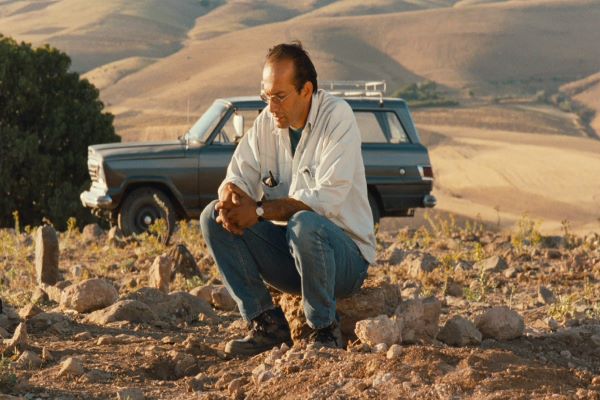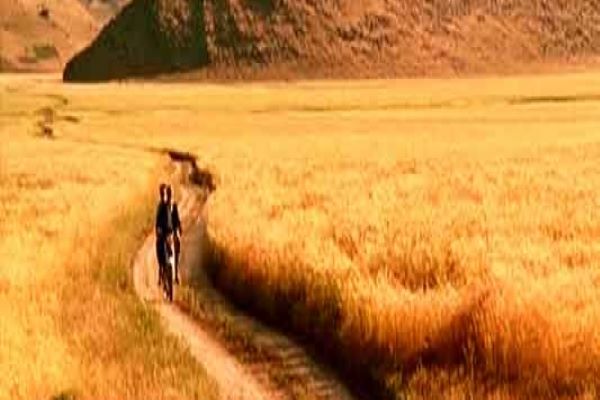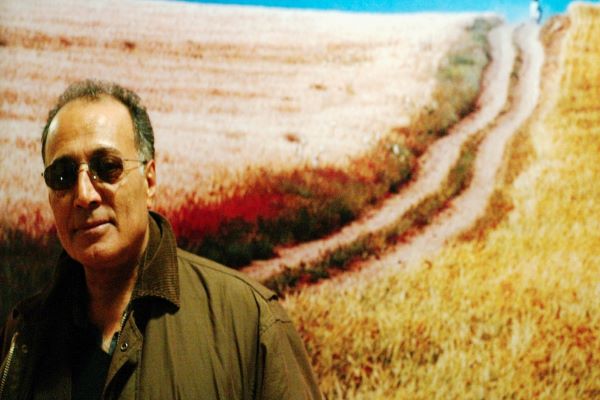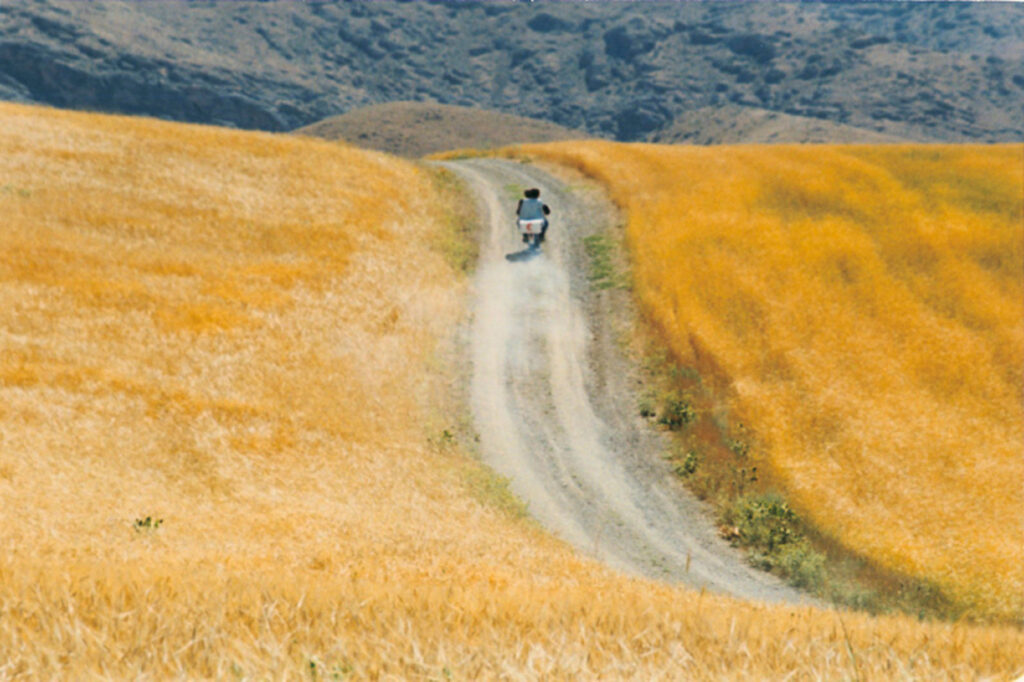Kiarostami’s The Wind Will Carry Us is a poetic film. A journalist named Behzad (Behzad Dourani) visits a Kurdish Iranian village to shoot the funeral rituals of a hundred-year-old woman. After spending a couple of weeks there, he finally abandons the mission and is about to leave the village when the old woman dies. As an optimistic and a master of poetic cinema, Kiarostami most certainly is not interested in death. This film shows the inevitability but also the unpredictability of death. The Wind Will Carry Us deals with the ideas of life, death, afterlife, spirituality, natural beauty, and the preciousness of life. It is a film about portraying important characters without showing them on screen.
Behzad along with three other crew members arrives at a Kurdish village. A schoolboy named Farzad (Farzad Sohrabi) waits for them on the way and guides them to the village. When Farzad asks Behzad the reason behind his visit, Behzad cites treasure hunting. However, he reveals that they have come there to shoot the anticipated funeral rituals of his grandmother, a hundred-year-old woman. Even though Farzad is busy with his ongoing school examinations, he guides Behzad and his team in their daily activities.

The crew waits for the demise of the old woman. However, she remains alive, which frustrates the crew. Farzad acts as a local guide and provides them regular updates on the old woman. Behzad receives regular calls from his supervisor Mrs. Godarji. Poor mobile network in the village forces him to drive up the hill. There on the hill, he talks to Yousuf who is digging a hole for a mobile tower. Yousuf tells Behzad to visit his house in the village and collect milk from his wife. Behzad visits his house, recites a poem written by Forough Farrokhzad to his wife, and collects the milk. Yousuf’s wife does not accept money as Behzad is a guest. Behzad becomes more and more frustrated day by day as the old woman is not dying. However, he is getting used to the village life and culture. He gets surprised when a lady gets back to work just a day after her delivery and she has ten children in total. Behzad also gets surprised when another lady runs a teashop herself. He starts appreciating the tranquil village life.
One day, there is a landslide in the hole that Yousuf is digging. Behzad rushes to the village and informs the villagers about the accident. A doctor is called on for the treatment. He refers Yousuf to the nearest hospital and assures Behzad that Yousuf will survive. The villagers take Yousuf into Behzad’s car and drive to the hospital. The doctor and Behzad ride a bike through a rippling wheat field and come back to the village. As the old woman is yet to die, the crew is leaving the village when Behzad sees a crowd of mourning women heading to her house. Behzad clicks a few pictures of them. He throws away the bone that he collected from the hill into a canal. The film ends with the bone being carried away by the stream of water.

The Wind Will Carry Us includes multiple philosophical aspects of life. Behzad and his team come to a Kurdish village to shoot the anticipated passing away of a hundred-year-old woman. However, they become frustrated and restless when the old woman keeps well and does not die. As a humanist and optimistic, Kiarostami most certainly is not interested in filming the passing away of the old woman. He wants to portray through this film that life and death are not in our hands. No human can control death. Life is precious and it needs to be celebrated. No matter how terribly we are down under the circumstances, there is always a ray of hope. Happiness should triumph over despair. No matter how much closer we are to death, the way forward is living life to the fullest. The Wind Will Carry Us is overall a film to celebrate life keeping aside the inevitability of death.
The Wind Will Carry Us is also a film about portraying characters without showing them. We do not see multiple important characters on the screen but can feel them. The viewers do not see the old woman, yet she is the pivotal character of the film. Yousuf who is digging a hole on the hill is never shown on screen, but we remember his conversation with Behzad. The face of Yousuf’s wife is not shown on screen, but we can feel her mood when Behzad recites a poem to her. Apart from Behzad, the other three crew members are also not shown on the screen. This film shows how efficiently a filmmaker can weave a film without showing multiple important characters. Kiarostami is not interested in revealing the entire details, rather he loves to keep his films open-ended so that the viewers can imagine the characters and place them properly in the stories. As per him, cinema must be poetic instead of merely a medium of storytelling. In real life also, we do not see many people but we can feel their existence. Their absence creates a deep void in our lives. We never forget our beloved ones long after they pass away. The Wind Will Carry Us deeply focuses on the afterlife and spirituality.

Like his other films, Kiarostami takes a strong position in favor of the women through this film as well. He shows in this film that a lady has delivered ten children in total. This film also shows that a woman can run a teashop all alone and she can strongly counter her husband when he belittles women’s role in society. Kiarostami stands strongly again the miseries of women and highlights their roles in society.
The Wind Will Carry Us is overall a poetic film. The title of the film is taken from the poem of the same title written by Forough Farrokhzad. Kiarostami wants to pay a tribute to the late poet through this film. Farrokhzad celebrated life, love, happiness, and reunion through her poem. The same way Kiarostami hails life and communion through this film. Farrokhzad wanted to come out of despair and sought love through her soulmate. In The Wind Will Carry Us, Kiarostami goes beyond death and looks into the afterlife and the spiritual journey of humans. Farrokhzad’s poem embraces the enormous beauty of nature. Kiarostami’s film captures the blissful rural life surrounded by picturesque natural beauty in the morning, afternoon, and night. The doctor directly quotes a poem written by Omar Khayyam while driving through the wheat field. He says that this world is surrounded by the precious gifts of nature like the sun, moon, stars, which are not there in heaven. Can heaven be better than the earth?
Apart from Behzad Dourani, Kiarostami mostly used non-professional actors in the film. All the actors in the film performed well. Mahmoud Kalari’s camera brilliantly captured the magnificent rural Iranian landscape. The Wind Will Carry Us was nominated for the prestigious Golden Lion at the 1999 Venice Film Festival. The film has received numerous awards thereafter.
